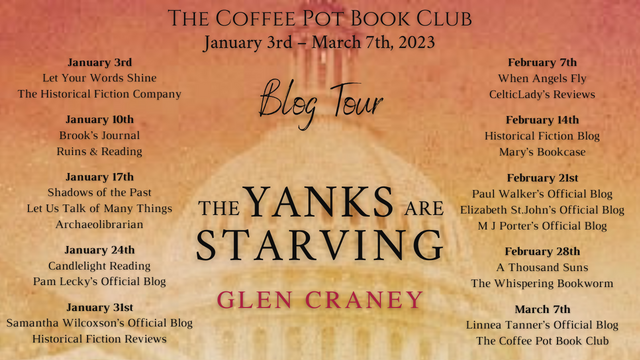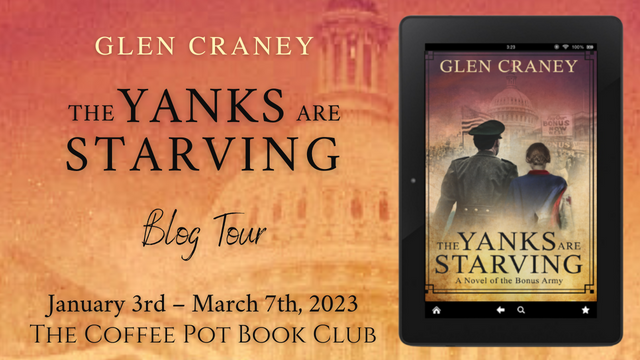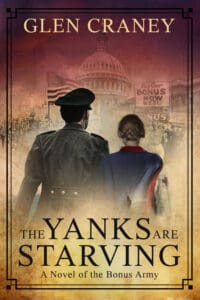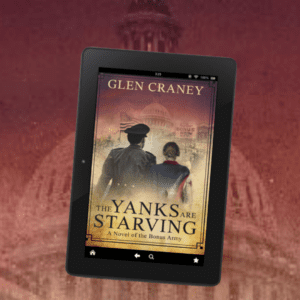
07 Mar Book Review The Yanks Are Starving Glen Craney #historicalfiction #BlogTour #TheCoffeePotBookClub @glencraney @cathiedunn
FEATURED AUTHOR: GLEN CRANEY
I am pleased to host Glen Craney again as the featured author in The Coffee Pot Book Club Blog Tour being held between January 3rd — March 7th, 2023. Glen Craney is the author of the Historical Fiction, The Yanks Are Starving: A Novel of the Bonus Army, released by Brigid’s Fire Press in January 2014 (561 pages)
Below are highlights of The Yanks Are Starving: A Novel of the Bonus Army, Glen Craney’s author bio, and my review of his novel.

To follow the blog tour, CLICK Tour Schedule Page
HIGHLIGHTS: THE YANKS ARE STARVING

The Yanks are Starving: A Novel of the Bonus Army
By Glen Craney
(Blurb)
Two armies. One flag. No honor.
The most shocking day in American history.
Former political journalist Glen Craney brings to life the little-known story of the Bonus March of 1932, which culminates in a bloody clash between homeless World War I veterans and U.S. Army regulars on the streets of Washington, D.C.
Mired in the Great Depression and on the brink of revolution, the nation holds its collective breath as a rail-riding hobo named Walter Waters leads 40,000 destitute men and their families to the steps of the U.S. Capitol on a desperate quest for economic justice.
This timely epic evokes the historical novels of Jeff Sharra as it sweeps across three decades following eight Americans who survive the fighting in France and come together fourteen years later to determine the fate of a country threatened by communism and fascism.
From the Boxer Rebellion in China to the Plain of West Point, from the persecution of conscientious objectors to the horrors of the Marne, from the Hoovervilles of the heartland to the pitiful Anacostia encampment, here is an unforgettable portrayal of the political intrigue and government betrayal that ignited the only violent conflict between two American armies.
Awards:
Foreword Magazine Book-of-the-Year Finalist
Chaucer Award Book-of-the-Year Finalist
indieBRAG Medallion Honoree
Praise for The Yanks are Starving:
“[A] wonderful source of historical fact wrapped in a compelling novel.” — Historical Novel Society Reviews
“[A] vivid picture of not only men being deprived of their veterans’ rights, but of their human rights as well.…Craney performs a valuable service by chronicling it in this admirable book.” — Military Writers Society of America
Buy Links:
Universal Link Amazon US Amazon UK Amazon CA Amazon AU
AUTHOR BIO: GLEN CRANEY

Glen Craney is an author, screenwriter, journalist, and lawyer. A graduate of Indiana University Law School and Columbia University Graduate School of Journalism, he is the recipient of the Nicholl Fellowship Prize from the Academy of Motion Pictures and the Chaucer and Laramie First-Place Awards for historical fiction. He is also a four-time indieBRAG Medallion winner, a Military Writers Society of America Gold Medalist, a four-time Foreword Magazine Book-of-the-Year Award Finalist, and an Historical Novel Society Reviews Editor’s Choice honoree. He lives in Malibu and has served as the president of the Southern California Chapter of the HNS.
Social Media Links:
Website Twitter Facebook Book Bub Amazon Author Page Goodreads
BOOK REVIEW: THE YANKS ARE STARVING

Glen Craney’s epic historical fiction novel, The Yanks are Starving: A Novel of the Bonus Army, recounts the tragic events of World War I and the Bonus March in 1932 when veterans marched on the U.S. Capital to demand the bonus promised by Congress for their services. The book is divided into Part One: No Man’s Land (1900-1919) and Part Two: Over Here (1931-1932). The stories of eight characters, who were actual historical figures or represented a distinct group, are woven together to capture the national disgrace of how the U.S. government turned against veterans seeking a bonus to help them financially during the depression. The story begins with a prologue set in December 1941, when World War I veteran Walter Waters shows up at a recruiting site for the navy. Throwing a flaming stick over a line of recruits, he warns that President Hoover came close to sparkin’ another American Revolution when he failed to deliver economic justice for destitute World 1 veterans.
Part One then goes back in time, setting the stage for social inequities, political corruption, and brave heroes who survived the carnage at the Marne in World War 1.
Part two meticulously details how jobless WWI veterans organized a group called the “Bonus Expeditionary Forces” (BEF) to march on Washington, DC. The BEF’s goal was to get the money Congress had promised in the Bonus Act. The catch was that this bonus would not pay out until each veteran’s birthday in 1945, paying out to his estate if he should die before. Walter Walters leads the veterans to set up camps and occupy buildings in various locations in Washington, DC. The largest center is a shantytown on the Anacostia Flats, across the river from Washington’s Navy Yard. When police try to move protesters out of occupied government buildings, two protestors are killed in a riot. After that, General Douglas MacArthur ruthlessly advances on the camps with tanks and tear gas to disperse the protestors permanently.
Author Craney masterfully weaves the threads of individual stories, culminating in a national tragedy when the army is called out to war on unarmed citizens. The prose is elegantly written, and the dialogue captures each character’s essence and the rawness of war and desperate events. It is a profoundly moving novel that will resonate in your mind after reading it. News reporter Gibbons summarizes the tragedy of the Bonus March as follows: “Tonight, in a dark, damp rail yard in the heart of this great country, two battles are being waged. One is for control of the economic crossroad of America. But a more desperate battle is for the souls of men and women who could be forgiven for believing that God is right behind our government in abandoning them….”
Though the individual stories seem disjointed initially, each voice is necessary to show how military leaders and politicians failed veterans. Social injustices, such as persecution against conscientious objectors, are realistically portrayed. Blacks, segregated in the U.S. army, are readily accepted by the French forces to fight alongside them. One of the most engaging characters is a Mennonite nurse, Anna, who must muster the strength to care for and comfort wounded soldiers without losing her soul.
The Yanks are Starving: A Novel of the Bonus Army is a captivating epic that realistically depicts the tragedy of how courageous soldiers who survived World War 1 were betrayed by military leaders and politicians at the time of their greatest need during the depression. Highly recommended.

Instagram: @thecoffeepotbookclub


Cathie Dunn
Posted at 03:21h, 07 MarchThank you so much for hosting Glen Craney today, Linnea, and for your wonderful review of The Yanks are Starving. I’m glad you enjoyed it. xo
Linnea Tanner
Posted at 10:00h, 07 MarchIt was my pleasure, Cathie, to host Glen Craney and to post a review of his memorable novel, “The Yanks are Starving.”
Glen Craney
Posted at 10:15h, 07 MarchThanks for the great review, Linnea!
Glen
Linnea Tanner
Posted at 10:12h, 10 MarchHi Glen–It was a pleasure to read your book and learn more about the Bonus March. This was a real eye-opener for me to learn how the WW1 veterans were dismally treated during the Great Depression.
Joy Gerken
Posted at 09:03h, 10 MarchI love war time stories, this one looks like no exception to the rule. I shall enjoy reading and reviewing.Thanks Linnea.
Linnea Tanner
Posted at 10:33h, 10 MarchHi Joy–Thank you for visiting and commenting on Glen Graney’s “The Yanks are Starving.” As a nurse, you would enjoy the story of Anna, a nurse in World War 1, that is woven into the novel. The epic story is an eye-opener about the horrors of WWI and some of the betrayals that American WW1 veterans suffered at the hands of both the enemy and their own commanders and government. Nurses such as Anna offered gleams of hope and compassion for the wounded and downtrodden. Though it was a long book, it was engaging and stayed in my mind after I finished it. I hope you are doing well in the United Kingdom.